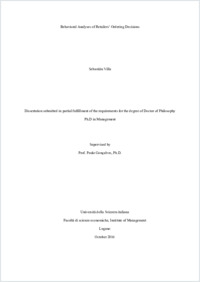Behavioral analyses of retailers’ ordering decisions
- Villa, Sebastián
- Gonçalves, Paulo (Degree supervisor)
-
05.10.2016
134 p
Thèse de doctorat: Università della Svizzera italiana, 2016
English
The main objective I pursue in this thesis is to better understand how different factors may independently and in combination influence retailers' ordering decisions under different supply chain structures (single agent and multi agent), different demand uncertainty (deterministic and stochastic), and different interaction among retailers (no interaction, competition and cooperation). I developed three different studies where I build on different formal management model and then run multiple behavioral studies to better understand subjects’ behavior. The first study analyzes order amplification in a single-supplier single-retailer supply chain. I used a behavioral experiment to test retailers’ orders under different ordering delays and different times to build supplier’s capacity. Results provide (i) a better understanding of the endogenous dynamics leading to retailers’ ordering amplification, and (ii) a description of subjects’ biases and deviation from optimal trajectories; despite subjects have full information about the system structure. The second study analyzes how order amplification can also take place when there is fierce retailer competition and limited supplier capacity. I study how different factors (different time to build supplier capacity, different levels of competition among retailers, different magnitudes of supply shortage and different allocation mechanisms) may independently and in combination influence retailers’ order in a system with two retailers under supply competition. Results show that (i) the bullwhip effect persists even when subjects do not have incentives to deviate, (ii) subjects amplify their orders in an attempt to build an unnecessary safety stock to respond to potential deviations from the other retailers, and (iii) retailers’ underperformance varies with the allocation mechanism used by the supplier. In the last study, I analyze retailers’ orders in a system where there is uncertainty in the final customer demand. I experimentally explore the effect of transshipments among retailers in a single-supplier multi-retailer supply chain. Specifically, I explore retailers’ orders under different profit and communication conditions. In addition, I integrate analytical and behavioral models to improve supply chain performance. Results show that (i) the persistence of common biases in a newsvendor problem (pull-to-center, demand chasing, loss aversion, psychological disutility), (ii) communication could improve coordination and may reduce demand chasing behavior, (iii) supply chain performance increases with the use of behavioral strategies embedded within a traditional optimization model, and (iv) dynamic heuristics improve overall coordination, outperforming a simple Nash Equilibrium strategy.
- Language
-
- English
- Classification
- Economics
- License
-
License undefined
- Identifiers
-
- RERO DOC 277614
- URN urn:nbn:ch:rero-006-115590
- ARK ark:/12658/srd1318711
- Persistent URL
- https://n2t.net/ark:/12658/srd1318711
Statistics
Document views: 324
File downloads:
- Texte intégral: 166
